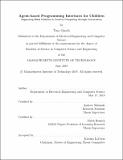Agent-based programming interfaces for children supporting blind children in creative computing through conversation
Author(s)
Quach, Tina,M. Eng.Massachusetts Institute of Technology.
Download1128882815-MIT.pdf (7.913Mb)
Other Contributors
Massachusetts Institute of Technology. Department of Electrical Engineering and Computer Science.
Advisor
Andrew Sliwinski and Mitch Resnick.
Terms of use
Metadata
Show full item recordAbstract
Children that learn to express themselves creatively and think computationally are empowered to create rather than solely consume technology. They practice creativity and learn strategies for solving problems, designing projects, and communicating ideas. However, children with visual impairments cannot access most programming experiences designed for beginners. This deprives these children of the chance to play with expressing themselves through programs that they design and create themselves. In this paper, we introduce Codi, a software agent that children can talk to in order to create, play, modify, and explore programs built using natural language. Through the design and implementation of Codi, I explore how agent-based programming interfaces can make programming accessible to children with visual impairments and multiple disabilities. Interviews, workshops, and test sessions with visually impaired children at Perkins School for the Blind led me to draw two conclusions: (1) Agent- based programming interfaces like Codi can facilitate meaningful creative learning experiences for children who cannot see. (2) In order to support children's engagement with computational thinking concepts and practices, agent-based programming interfaces need onboarding experiences, learning resources, and facilitation that helps learners surface and pursue their own interests and integrate computational thinking concepts.
Description
This electronic version was submitted by the student author. The certified thesis is available in the Institute Archives and Special Collections. Thesis: M. Eng., Massachusetts Institute of Technology, Department of Electrical Engineering and Computer Science, 2019 Cataloged from student-submitted PDF version of thesis. Includes bibliographical references (pages 153-159).
Date issued
2019Department
Massachusetts Institute of Technology. Department of Electrical Engineering and Computer SciencePublisher
Massachusetts Institute of Technology
Keywords
Electrical Engineering and Computer Science.